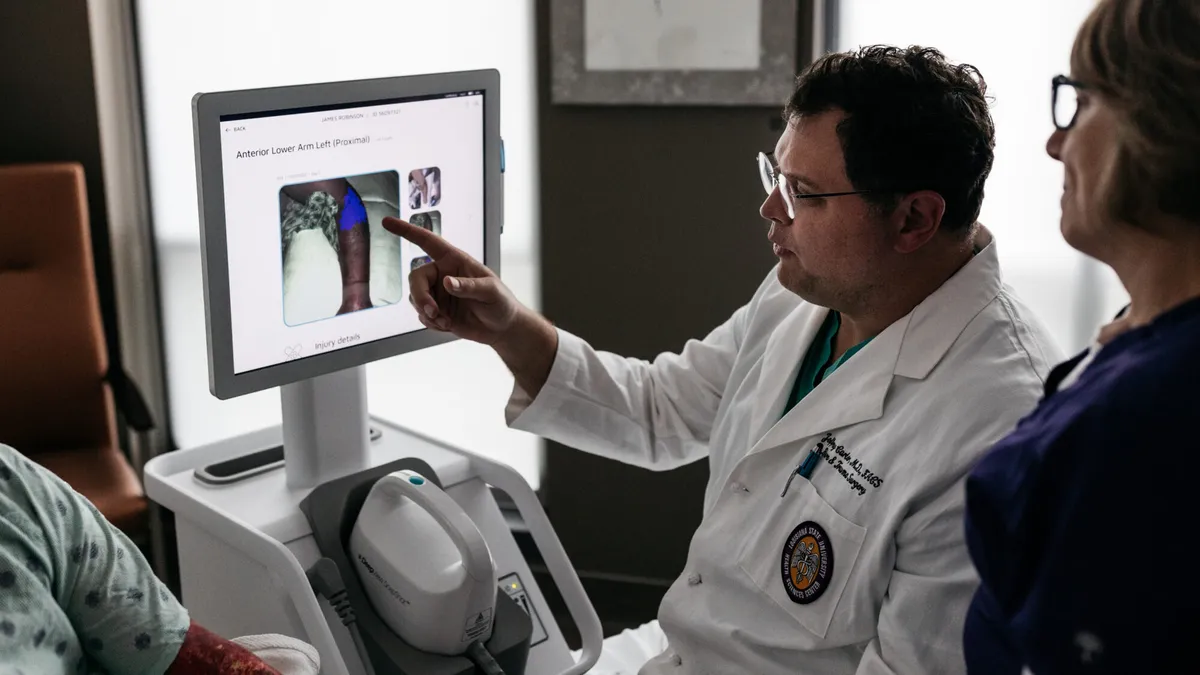Siemens Healthineers' Varian is among the latest companies to receive FDA breakthrough device designation, securing the regulatory privileges for its noninvasive treatment of knee osteoarthritis.
FDA granted breakthrough device status to Varian's Embozene microspheres in the treatment of symptomatic knee osteoarthritis. The microspheres, which are already used to treat some cancers and other diseases, are injected into the artery in the knee to drive embolization. By blocking up the vessel, the microspheres are designed to reduce blood flow to the affected region and thereby limit the inflammatory process and pain.
Varian, which bought the technology from Boston Scientific, is now working with collaborators to validate the use of microspheres in knee osteoarthritis. Building on a 40-patient study, researchers at UCLA Santa Monica are preparing to start a randomized clinical trial and a 400-patient registry. The work will advance Varian's efforts to reach the 14 million patients with symptomatic knee osteoarthritis in the U.S.
Magnus Medical received FDA breakthrough status for its non-invasive neurostimulation treatment for major depressive disorder. The system is based on technology licensed from Stanford University, which tried to improve on the intermittent theta-burst stimulation (iTBS) already used in people with treatment-resistant depression.
Stanford researchers called the resulting treatment "a high-dose iTBS protocol with functional-connectivity-guided targeting." In a 32-patient study, the depression scale score fell 52.5% in the active treatment group, compared to an 11.1% decline in the sham control cohort. Boosted by the data, Magnus has raised $25 million to develop the system for use in patients failed by existing treatment options.
FDA granted breakthrough status to Renovia's first-line digital therapeutic treatment for chronic fecal incontinence in women. The device, which FDA has already cleared for use in urinary incontinence and pelvic floor strengthening in women, is a small vaginal wand designed to help patients train and strengthen their pelvic floor muscles. Renovia has paired the wand with a smartphone app to create its leva Digital Therapeutic.
MY01 received breakthrough designation for a device designed to aid the diagnosis of compartment syndrome, a condition characterized by the build up of pressure within an enclosed muscle space. The device is a single-use microsensor that continuously measures pressure in the at-risk muscle compartment for up to 18 hours. Currently, physicians only take a single pressure measurement, preventing them from understanding the overall trend of the patient's condition.
FDA awarded regulatory privileges to Biological Dynamics' early-stage pancreatic cancer test. The liquid biopsy is designed to detect biomarkers of elevated risk of pancreatic cancer to enable earlier diagnosis. Treatment of pancreatic ductal adenocarcinoma is currently hindered by the fact the disease is asymptomatic in its early stages, meaning patients have advanced disease before they are diagnosed.
Sanford Health landed FDA breakthrough status for a stent graft intended for use in thoracoabdominal aortic aneurysm patients. The device is designed to provide a minimally invasive alternative to the open surgery typically used to treat the patients today. The Sanford vascular surgeon behind the device has used the approach on more than 150 patients over the past nine years, leading to a partnership with other health systems to generate more data.
FDA awarded breakthrough status to the targeted liver therapy in development at HistoSonics. The device uses acoustic energy to destroy tissue in the liver without incisions, ionizing radiation or heat. An investigational device exemption study is underway to evaluate treatment size and coverage.
Finally, Alpha Tau Medical picked up another breakthrough status for its alpha-radiation cancer therapy Alpha DaRT. The breakthrough status, which comes months after Alpha Tau secured the FDA designation in skin cancer, covers the use of the intratumoral radiotherapy in patients with the aggressive brain cancer recurrent glioblastoma multiforme.



















